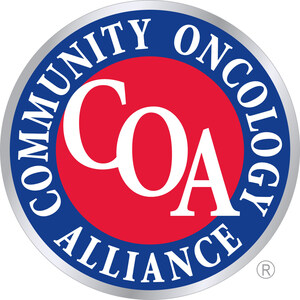New Study Confirms Quality Of Care And Cost Efficiency Of Integrated Community Oncology Practices
Innovations in New Payment Reform Models Pioneered by Community Oncology Threatened by Consolidation into More Expensive Hospital Systems
WASHINGTON, April 23, 2015 /PRNewswire/ -- The Community Oncology Alliance (COA) released a comprehensive study of the value provided and challenges faced by integrated community oncology practices, the foundation of the nation's cancer care delivery system. A Detailed Diagnosis of Integrated Community Oncology was introduced at the opening of the 2015 Community Oncology Conference in Orlando, Florida April 23–24. The COA-sponsored study, the work of Berkeley Research Group (BRG) researchers Aaron Vandervelde and JoAnna Younts, included the following findings:
- Integrated community oncology practices share common characteristics including care coordination, patient–provider communication, and personal attention.
- In addition to providing access to cancer care at a lower cost than hospital outpatient departments, integrated community oncology practices deliver state-of-the-art cancer care and are beginning to adopt innovative healthcare delivery and payment models.
- The challenges facing integrated community oncology practices are both pushing and pulling these practices into higher-cost hospital outpatient departments.
The study examined common misconceptions about community oncology practices, including cancer care services, innovative care, and access to clinical trials. The study revealed:
- Many community-based practices interviewed provide all cancer services, from diagnosis through treatment to survivorship support.
- The latest technologies and drugs are available in community practices as well as hospitals, and preliminary results of an ongoing study of utilization and quality measures suggest that community-based models actually perform better than hospitals on certain measures.
- Over 75 percent of respondents to the survey reported availability of clinical research opportunities in their practices.
Finally, analysis suggests that the primary benefits to patients of integrated community oncology practices are threefold:
- Lower costs relative to hospital outpatient care
- Efficient care delivery, particularly through medical home models
- Personalized delivery of care
"Community oncology is the foundation of the American cancer care delivery system," said Ted Okon, COA executive director. "Community oncology practices are involved in more payment reform initiatives than any other area of medicine in terms of actually enhancing the quality of medical care while reducing costs. However, it is a crime that the innovation is threatened by declining payment for cancer care, increased government regulation getting in the way of oncologists treating their patients, and consolidation into more expensive hospitals. "
The study was conducted through a combination of literature review, physician and administrator interviews, data analytics, and a survey of integrated community oncology practices. The study was commissioned by COA. The full study is available at www.communityoncology.org/coa_flipbook_2/.
"What we learned through this study is integrated community oncology practices are providing leading-edge cancer care in a convenient, high-touch environment at a lower cost than hospital outpatient departments," said Aaron Vandervelde. "Patients and payers alike are benefiting enormously from these practices and the coordinated and personalized approach they bring to cancer care."
About Community Oncology Alliance (COA)
The Community Oncology Alliance (COA) is a non-profit organization dedicated solely to preserving and protecting access to community cancer care, where almost 70 percent of Americans with cancer are treated. COA has led community cancer clinics in navigating an increasingly challenging environment to provide efficiencies, patient advocacy, and proactive solutions to Congress and policy makers. COA members have testified before both chambers of Congress, authored cancer care demonstration projects, and been instrumental in the passage of oral cancer drug parity legislation, among many other initiatives. More information can be found at www.CommunityOncology.org.
About Berkley Research Group (BRG)
Berkeley Research Group, LLC (www.thinkbrg.com) is a leading global strategic advisory and expert consulting firm that provides independent advice, data analytics, authoritative studies, expert testimony, investigations, and regulatory and dispute consulting to Fortune 500 corporations, financial institutions, government agencies, major law firms, and regulatory bodies around the world. BRG experts and consultants combine intellectual rigor with practical, real-world experience and an in-depth understanding of industries and markets. Their expertise spans economics and finance, data analytics and statistics, and public policy in many of the major sectors of our economy, including healthcare, banking, information technology, energy, construction, and real estate. BRG is headquartered in Emeryville, California, with offices across the United States and in Australia, Canada, Latin America, and the United Kingdom.
SOURCE Community Oncology Alliance
Related Links
http://www.CommunityOncology.org
WANT YOUR COMPANY'S NEWS FEATURED ON PRNEWSWIRE.COM?
Newsrooms &
Influencers
Digital Media
Outlets
Journalists
Opted In




Share this article